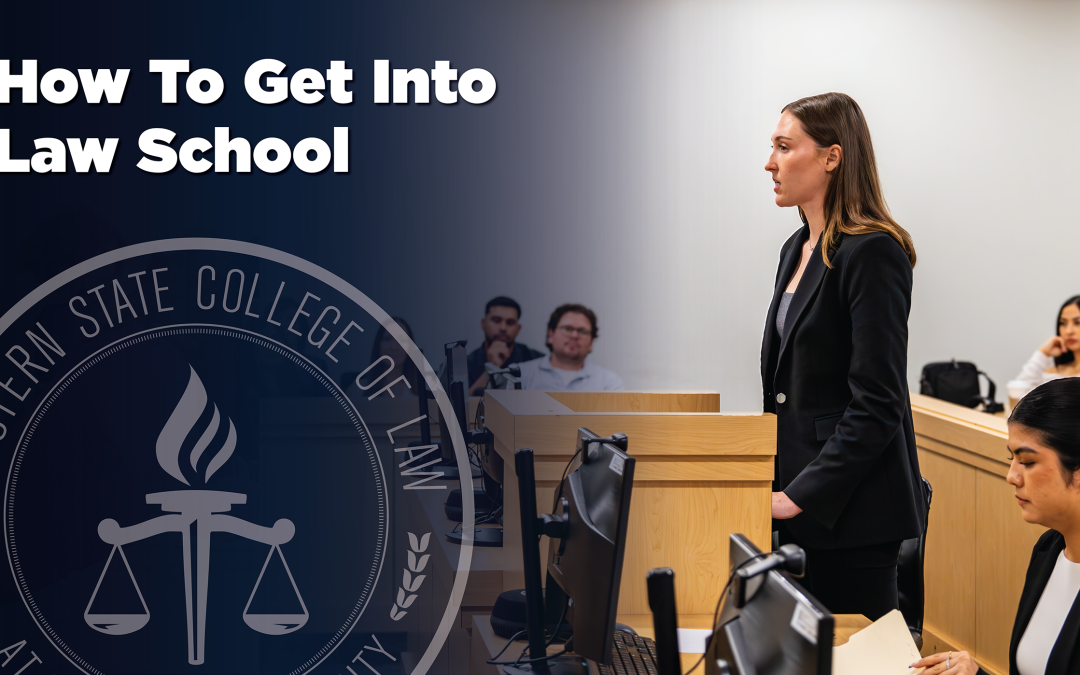Written by: WSCL Admissions Team
Getting into law school is a huge step for those pursuing their dreams of becoming a lawyer, but the application process can feel overwhelming, especially if you’re unsure where to start. If you’re a college student weighing your options, or a working professional thinking about switching careers, applying for law school requires careful planning, preparation, and a solid grasp of what admissions committees are looking for.
At Western State College of Law, the oldest law school in Orange County and one of the most affordable law schools in California, we’ve worked with thousands of applicants, each unique in their journey. In this guide, you’ll find a detailed breakdown of all the steps of the admissions process, with expert insights from our Assistant Dean of Admissions, Rhonda Cohen. With it, you can confidently take your next step toward becoming a lawyer.
Understand What Law Schools Are Looking For
Law schools seek candidates with strong academic ability, critical thinking skills, and a passion for the law. To evaluate these qualities, most ABA-accredited law schools will ask you to submit your application materials through the Law School Admission Council (LSAC) Credential Assembly Service (CAS). This centralized platform allows you to explore school profiles and manage all your applications. It streamlines the application process by compiling your transcripts, LSAT or GRE test scores, letters of recommendation, and other documents into one complete package for schools to review.
Although each law school may have its specific requirements, here’s what you’ll typically need to include:

- A bachelor’s degree OR a transcript showing the bachelor’s degree is confirmed.
- An official transcript from every college you have attended.
- An LSAT or GRE score.
- A personal statement tailored to each school.
- Two letters of recommendation.
- A CAS report, which includes a writing sample, academic summary, and more.
- Character and fitness disclosures detailing any academic or legal issues.
Western State doesn’t ask for a resume with your application, but some schools do, along with additional essays. It’s a good idea to check each school’s website for detailed requirements. At Western State, we waive the application fee, making law school more affordable and accessible to all prospective students. Other schools may charge application fees, so be sure to look into that when you visit their websites.
Choose the Right Undergraduate Path for You
A common misconception about law school is that you have to major in political science or pre-law to get in. In reality, law schools value various academic backgrounds, including STEM fields, English, economics, and arts. What matters most is not your major but the skills you develop and your academic performance.
There’s no specific GPA cutoff for law school admissions, but most schools share the median GPA of their incoming students to help applicants gauge competitiveness. At Western State, the median GPA for the most recent admissions cycle was 3.26. However, our admissions committees evaluate each GPA in context. For example, a 3.5 GPA in a challenging STEM program may be considered just as strong—or even stronger—than a 3.8 in a less rigorous major. Additionally, if your transcript shows an upward trend in your grades, it highlights your work ethic and academic growth, both of which are important to emphasize in your personal statement.
Use Pre-Law Advisors and Resources
Starting your law school journey early is key. One crucial step is reaching out to your undergraduate institution’s pre-law association and advisors. These resources help students explore the field of law and prepare to apply to law school. Dean Cohen recommends tapping into these resources as early as your freshman or sophomore year so you can make informed choices and prepare strategically.
Your pre-law advisor can also help you build a timeline for applying to law school, choosing the right exam, and finding programs that best fit your goals. Starting this process early is essential, so don’t wait until your senior year. The sooner you begin, the better prepared you’ll be.
Gain Legal Experience and Clarify Your Commitment
Before deciding to go to law school, take the time to make sure the legal field is right for you. One way to do that is by getting hands-on experience. You can do this as a paralegal or legal assistant, or through a short-term internship or clerkship at a law firm, government office, or nonprofit legal organization.
Spending time in a legal environment gives you a firsthand look at how lawyers work, their tasks, and how they interact with clients, courts, and colleagues. It’s also a great way to network and start thinking about your future goals. You may find that you love litigation or prefer transactional work; either way, this experience will enrich your personal statement and boost your confidence when speaking with admissions committees. Dean Cohen emphasizes that these opportunities can help you decide if the legal field suits you and strengthen your application by showcasing your proactive approach and passion.
Research Schools Using LSAC and Law School Forums
Law School Forums, provided through LSAC, offer large-scale, in-person or virtual events where prospective students can meet admissions representatives from hundreds of law schools. Attending a forum allows you to ask questions, pick up informational brochures, and start deciding which schools fit you most. You don’t have to wait until your senior year to attend these forums. Dean Cohen strongly advises attending them as early as your undergraduate freshman or sophomore year to get a feel for law school and narrow down your choices.
When looking into law schools, look beyond national rankings. Consider the location, the expertise of the faculty, class sizes, bar passage rates, and the strength of their alumni network. Also, pay attention to the areas of law each school specializes in and whether it fits your interests. The best law school for you will align with your academic interests and your long-term goals.
Choose the Right Exam: LSAT vs. GRE
The LSAT remains the most widely accepted exam for law school admissions, but many schools, including Western State, now also accept the GRE. While both tests evaluate skills essential for success in law school, they approach the assessment differently.
The LSAT evaluates:
- Logical reasoning
- Analytical reasoning
- Reading comprehension
- Writing (unscored but included in your CAS report)
The GRE tests:
- Verbal reasoning
- Quantitative reasoning
- Analytical writing
If you’re strong in math or applying to other graduate programs as well, the GRE might be a better fit. But if you’re targeting law school specifically, the LSAT is still considered the conventional exam.
When deciding between the two, consider your strengths and what the schools you’re applying to are looking for. Once you’ve chosen, give yourself several months to study. There are many resources available to help you study, including official prep materials, full-length practice tests, and even courses designed to prepare students for the exam. Be sure to make use of these, especially the full-length practice exams which help you get used to the exam format and learn to allocate your time for each question. It’s normal not to hit your target score right away; keep practicing consistently and you will see improvement.
Like GPA, there’s no official LSAT cutoff at most law schools. Instead, schools typically will share the median LSAT score of their admitted class, which, for Western State, was 151 for the most recent admissions cycle.
Remember, law schools review applications holistically. A slightly lower LSAT score can be offset by a strong GPA, compelling personal statement, legal experience, or other standout qualities.
Craft a Standout Personal Statement
The personal statement is one of the most critical components of your application. It gives you a chance to share your story, explain who you are, why you want to study law, and what life experiences have influenced your ambitions. It’s your opportunity to connect with the admissions committee on a personal level; be sure to show them who you are beyond your grades.
Your statement should be authentic and well-structured. Think about the experiences that fueled your passion for law. Maybe you volunteered with communities in need, discussed policy issues in college, or overcame personal obstacles that inspired you to advocate for others. Remember, being authentic is more important than being perfect.
Be sure to customize each personal statement for the school you’re applying to. Mention any unique programs, clinics, or values that resonate with you. And don’t forget to proofread! A personal statement with typos or inconsistencies, especially naming the wrong school, is a major red flag for admissions committees.
Request Letters of Recommendation
Most law schools ask for two letters of recommendation. Ideally, these should come from professors or professional supervisors who can speak to your academic ability, communication skills, and potential as a law student. These letters can be significantly advantageous, especially if your GPA or test scores are not as high as you’d like.
Give your letter writers at least four to six weeks’ notice when you ask for a recommendation letter. Provide them with your resume and personal statement and let them know what programs you’re applying to so they can write letters that are tailored, well-informed, and aligned with your application.
Showcase Meaningful Extracurricular and Professional Experience
Law schools value applicants who are well-rounded and engaged in activities beyond academia. If you’ve led student organizations, done community service, written for campus publications, or juggled work while studying, these experiences show initiative, leadership, and time management. Dean Cohen recommends emphasizing the depth and commitment of your work to show how these experiences have equipped you for law school.
Working adults applying to law school are often concerned about having a gap between college and law school due to their full-time jobs. However, many law schools see work experience as a valuable asset, especially when it demonstrates leadership, responsibility, or a dedication to public service.
Use your resume to emphasize your transferable skills, like public speaking, negotiation, writing, or critical thinking. These real-world experiences can really set you apart, particularly if they directly tie into your passion for law.
Stay Organized and Meet Every Deadline
Applying to law school involves managing multiple elements, including your CAS account, test registrations, transcript requests, recommendation letters, and various school timelines. Missing a deadline by just one day can delay or disqualify your application. To stay organized, start early and use a tool to keep track of important dates and tasks, like a spreadsheet or calendar. Prioritize the schools with rolling admissions, where applying early can give you a leg-up in being admitted and considered for scholarships. That said, never sacrifice quality for speed. A well-prepared, polished application submitted a little later is far more competitive than a rushed one submitted just to meet an early deadline.
Communicate with Admissions Teams
An often overlooked strategy in law school admissions is simply asking questions. If you’re unclear about any of the application components, deadlines, score policies, or how your GPA will be evaluated, contact the admissions team. Admissions teams are open to questions and happy to explain what they’re looking for in personal statements and how they evaluate applicants based on GPA and test scores.
At Western State, we encourage prospective students to contact us. Our team is here to answer your questions and offer guidance to help make your application as strong as possible. Taking the initiative to reach out can make a strong impression before we review your application.
Plan for Application Costs
Applying to law school also comes with financial considerations. The LSAT and GRE both have registration fees: $238 and $220, respectively. Students often buy prep materials and take online courses; you’ll also need to budget for the CAS subscription fee through LSAC, which is $207 for registration and $45 for each report. As mentioned, Western State doesn’t charge an application fee. But many law schools do, so it’s important to verify the fees listed on each school’s website. It’s worth looking into any fee waivers that may be offered by LSAC or the schools themselves to ease the financial burden. By planning ahead for these expenses, you’ll be better prepared both academically and financially.
Ready to Start Your Law School Journey?
With a clear plan and the right support, you can create a strong application that highlights your unique strengths and goals. Start by creating your LSAC account, researching law schools, and mapping your plan. If you’re looking for a law school with experienced faculty, a close-knit community, and a strong track record of supporting student success, we invite you to learn more about Western State.
Visit wsulaw.edu to explore our programs, connect with our admissions team, and take the next step toward becoming the lawyer you’re meant to be.




